Contractors are a fundamental part of the agricultural ecosystem.
The huge operational price increases of running equipment and such businesses over the past decade, and in particular the last 24 months has made many sit down and rethink.
As a result, we’ve seen north of 50 contractors exit the business in this time frame, with quite a few more seriously considering the same in the near future.
On the flip side, there are lots of young and innovative contractors out there building a name for themselves. We speak to three young contractors to find out how they’ve got to where they are, and what future they see in the business.
Where are you based and what’s your background?

Mark Daynes.
“We are based at Dunlavin on the Wicklow-Kildare border at the foot of the Wicklow mountains. I work alongside my father. I look after most of the day-to-day running of the contracting business, while my father runs the family’s 500ac tillage block. I studied a level 6 at Kildalton, followed by a level 7 in agriculture for three years at Cork Institute of Technology and finished off my level 8 in land management at Waterford. Afterwards, I returned home to the family business.”
How long have you been contracting?
“My grandfather began the contracting business in the 1950s. It was all tillage-based. My father continued the business, and branched into grass work in 1997. He bought a JF 900 trailed harvester predominately for use on our farm, and began some hire work to help pay for the machine. In 2008-2009, my father began to wind down the business but I had big plans for it so we kept it going. I did my Leaving Cert in 2012, and you could say I became involved in the business from then, before stepping up to the mark full-time when I finished college.” 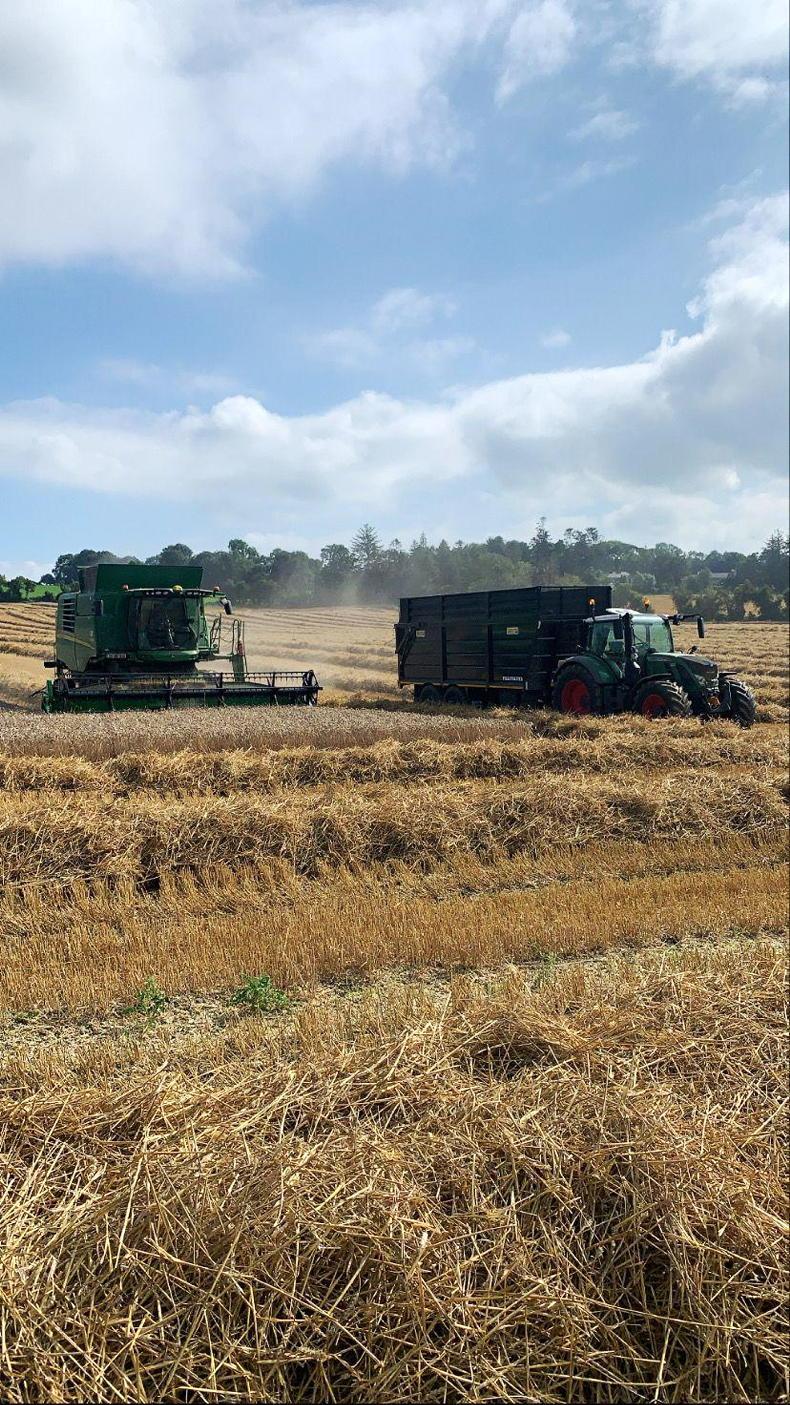
Tell us a little bit about your business and what services you offer?
“We offer a wide range of services, using a fleet of modern classic tractors. We do a lot of share-farming, and offer a full tillage service. We spread slurry, cut silage, make bales, cut hedges and spread fertiliser. Most of our work is within six miles of the yard,but we do travel further for bigger jobs.”
Why did you choose to go down the contracting route?
“You could say I have ‘shiny metal syndrome’. There’s parts of the job I love, and parts of it I hate. Overall, I’ve always loved the job and I’ve always had a great interest in it.”
How many staff are employed in the business?
“We have four labour units employed here all year round. This includes two full-time staff, my father and me. At our busiest in August, we could have up to 10 people working with us. We employ a local mechanic three to five days a week. He also drives for us, and is a huge addition. Overall, we are very lucky with labour. We found that two to three years ago it was much harder to find suitable labour.”

What opportunities/challenges do you see in contracting at present?
“With the new CAP, I see opportunities in precision technologies such as auto steer and section control and farming methods such as min till and direct drilling. I see opportunities in being genuine and looking after customers. We see contracting as a partnership. If we do a bad job, it affects the farmer’s bottom line, and they will have less money to pay us. We try to work with our customers.
“The biggest challenge is the costs; they are just enormous. Our breakdown bill last year was €40,000 alone. That didn’t include any other running costs such as servicing, general wearing items or tyres. I can see labour being an issue for every contractor going forward, and more so the price of labour. Contractors simply can’t compete with other industries such as construction.”
Do you see a future in agricultural contracting in your area?
“We are in a very densely populated area with contractors.
“We try not to poach work, but even with all the competition, we are gaining work each year. As long as farming continues, I can see a role for the contractor.”

What single piece of advice would you give to a younger you or someone starting out in the sector?
“Do your best and the work will follow. You will need to be competitive, but don’t go undercutting prices. There is no point in working for nothing.”
Where are you based and what’s your background?
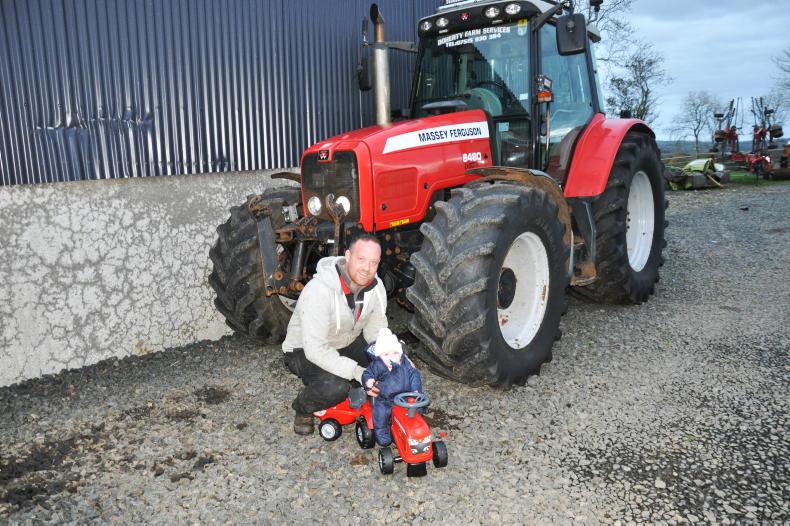
Ryan Doherty and his son Fionn.
“We’re based at Dunloy in Co Antrim. When I left school, I went to study mechanical engineering. I gave it one year, then decided to pursue a one-year agriculture course at Greenmount College. When I completed this, I went driving for a local agricultural contractor.”
How long have you been contracting?
“I went contracting in my own right when I was 19 in 2007. I bought a Vicon RF135 round baler and a Vicon wrapper, while my uncle carried out the mowing for me. The first year went very well, and I decided to take the plunge and buy a SlurryKat umbilical system the following year.
“My uncle had been doing a little bit of slurry spreading on hire, so we both gave each other some help which worked out well.”
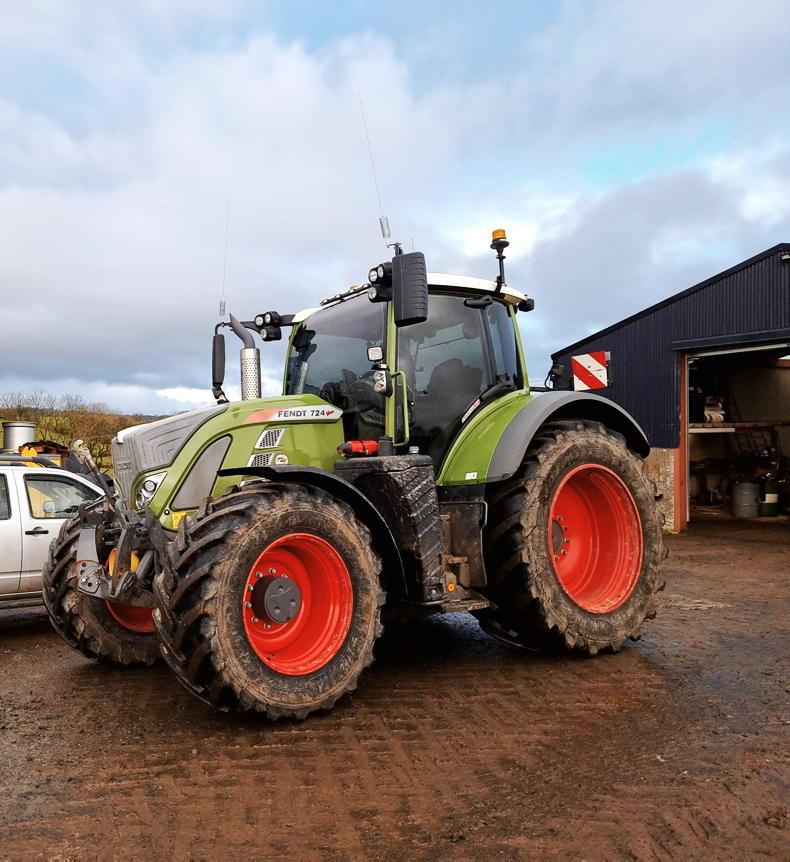
Ryan Doherty Farm Service
Tell us a little bit about your business and what services you offer?
“Over the years, I added more and more services to develop the business into an all-year-round, full-time operation. The baling and slurry remain key to what we do, but we also run a forager, diggers and offer hedge-cutting.” 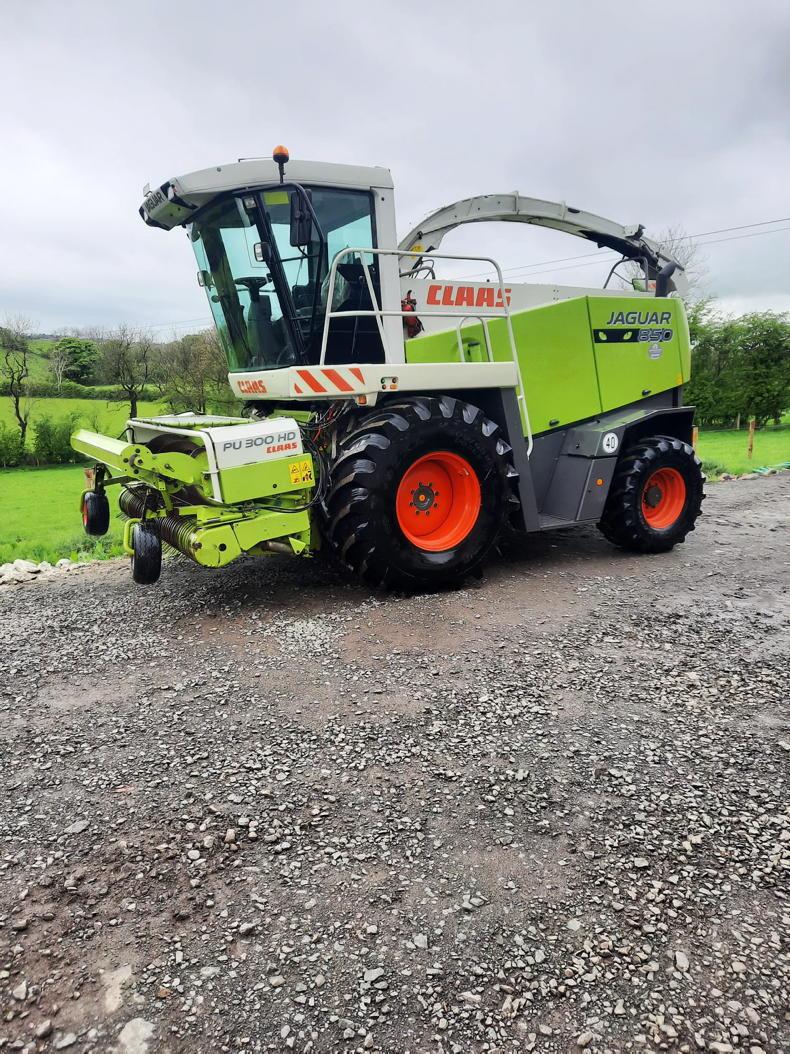
Ryan Doherty Farm Service
Why did you choose to go down the contracting route?
“From day one, it’s all I ever wanted to do. When I was very young, I remember seeing the local contractor at the time cutting silage for a neighbour, and that was the start of it for me. When I went to work with a contractor after college, this continued to feed the fire. I don’t know is it ambition or greed, but I just wanted to grow and grow.”
How many staff are employed in the business?
“We employ two brilliant full-time staff. My father is farming and is a huge help to me when the pressure comes on. When we get busy at slurry and silage, we take on some casual part-time labour. At peak, we might have six or seven lads with us. Good staff are everything in this business. We generally don’t have a shortage of drivers in this area.”
What opportunities/challenges do you see in contracting at present?
“It’s very hard to see opportunities in contracting in the current climate. If I was a young guy starting out today, I don’t know would I be as eager to get into the business. Getting new work generally isn’t easy, as there is no shortage of contractors around.
“I bought my first tractor with guidance this year. We offer section control fertiliser spreading and use flow meters on our slurry system. Accuracy with inputs will be big going forward.
“There are two big challenges at present. Firstly, there is the price of equipment. For example, a new Fusion four years ago was around £62,000. Today, it’s north of £80,000. Same with tractors. In 2020, I gave £82,000 for a new tractor. That same tractor today is £120,000. Unfortunately, the rates haven’t increased accordingly. It’s not just equipment, parts and insurance etc are all on the up.
“Secondly, contractors need to watch their finances. Doing the work isn’t the hard part, it’s getting the money in to keep the business moving.” 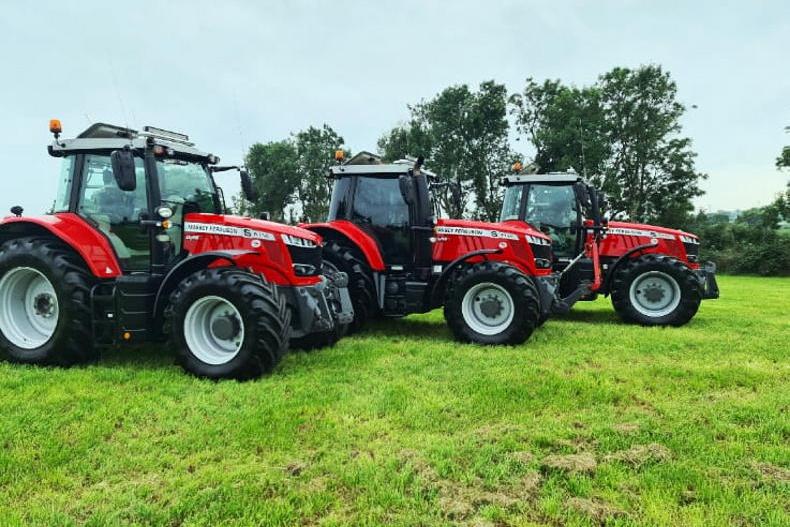
Ryan Doherty Farm Services
Do you see a future in agricultural contracting in your area?
“I continue to see a living to be made from contracting. I look after my customers the best I can and in turn they look after me. I am where I want to be with my business, size-wise. The only worry I have is that when farmers retire, in many cases there is no one coming behind them. There are loads of contractors in this area, so replacing that work which potentially will be lost won’t be easy.”
What single piece of advice would you give to a younger you or someone starting out in the sector?
“The one piece of advice I will give is don’t go all out at the start. Ease into it, start humble. Give it time and you’ll get where you want to be. Don’t think you’re going to take over the world contracting. It’s not all sunshine and playing good tunes. There will be lots of bad days, but the good days will make up for it. I enjoy contracting, if you don’t, you won’t be at it. Contracting will consume your life.” 
Kieran Galvin, Co Kerry.
Where are you based and what’s your background?

Kieran Galvin.
“I’m based at Ballyferriter, west of Dingle. We’re surrounded by water on three sides. We work on everything from good to very bad ground, some of which is very hilly. I finished school in 2007 and went driving with an agricultural contractor. I loved the silage work, and spent the winters at silage in New Zealand and the summers at silage in Kerry.”
How long have you been contracting?
“In 2013, the contractor I had been working for asked me to draw in and stack bales he was making. I bought my first tractor and trailer and I grew the business from there. Today, I keep 40 suckler cows and run the agricultural contracting business.”
Tell us a little bit about your business and what services you offer?
“We offer baling, bale haulage, slurry and most recently hedge-cutting services. We are limited with offering other services due to the huge levels of rainfall and the land use in this area. We run four John Deere tractors and focus solely on silage during the summer to offer the best service we can.”
Why did you choose to go down the contracting route?
“Since I was able to walk, all I wanted to work at was tractors, I never wanted to go at anything else. The opportunity arose in 2013 and I decided to take it, and build the business from there.”
How many staff are employed in the business?
“I have no full-time staff, just part-time staff. In the winter, I’m by myself, and I have three part-time lads for the summer months. My girlfriend and some friends also help me when the pressure comes on. I actually went looking to take on a full-time guy last spring but I couldn’t find anyone suitable. I think lack of good staff will be a big limitation for contractors going forward. You have to love it to be at it, and I think there’s a generation missing – young guys today don’t have the same drive.”
What opportunities/challenges do you see in contracting at present?
“Every farmer needs a contractor. But sometimes, I feel contractors don’t get the full support they deserve from farmers. I think survival will be the biggest achievement in our game, especially with a lack of staff – there’s only so much any one person can do by themselves”.
“Everyone puts too much of a focus on diesel prices. Even though diesel is a major input, and its price is well back on last year, the cost of finance, parts, insurance and equipment has completely soaked up any dip in fuel prices. Take tyres for example, contractors can’t buy tyres out of cashflow anymore.
“Most contractors are now financing them. Labour and the weather are the biggest challenges where I’m based. In general, I think contractors are their own worst enemy when it comes to invoicing and collecting money. There needs to be a mindset change here. Things are getting tighter every year, and every business needs cashflow to operate.”
Do you see a future in agricultural contracting in your area?
“Farming is so uncertain at the moment. Farmers don’t know what they’re own future holds, so its impossible for contractors to predict what their future will look like. I think if circumstances change, contractors shouldn’t be afraid to get out of the business. Pride will always play a factor here, but more and more contractors have seen the light and got out of the business.”
What single piece of advice would you give to a younger you or someone starting out in the sector?
“If it’s in your blood, you’re going to do it. I shouldn’t say it, but the reality is that if I invested the money I’ve spent on machinery into property, I’d have had a much greater return and be making an easier living. Contracting isn’t for everyone. The one thing I’d advise anyone starting is not to go mad. It’s easy-to-get finance, but making the payments for the machines is a different story.” 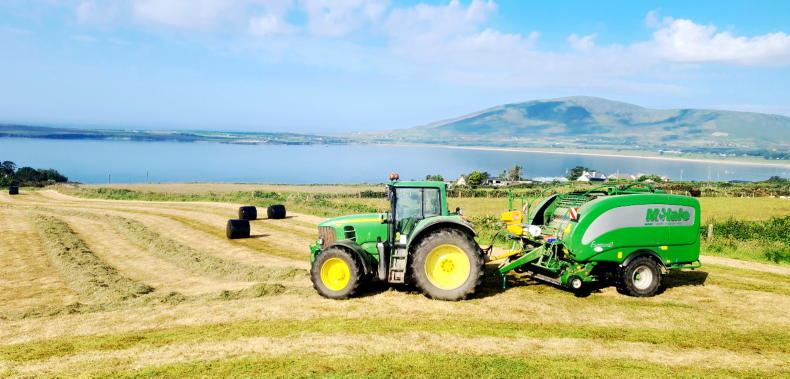
Kieran Galvin, Co Kerry.
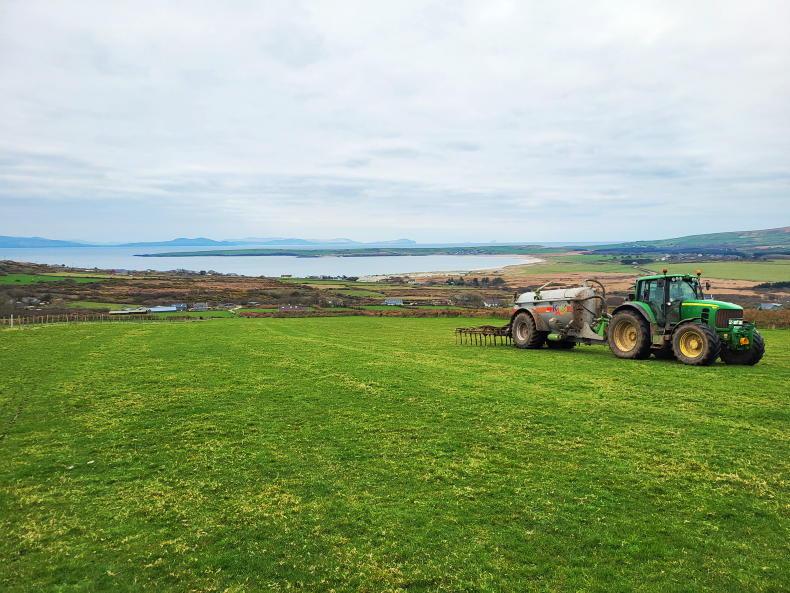
Kieran Galvin, Co Kerry.
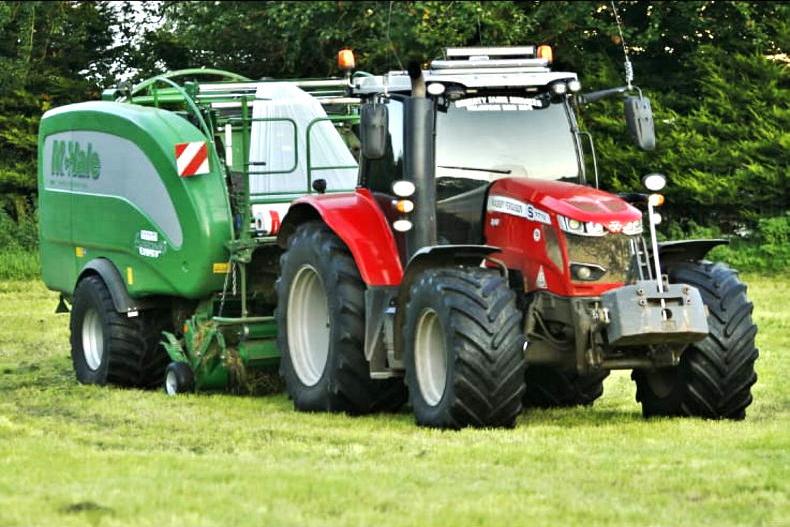
Ryan Doherty Farm Service
Contractors are a fundamental part of the agricultural ecosystem.
The huge operational price increases of running equipment and such businesses over the past decade, and in particular the last 24 months has made many sit down and rethink.
As a result, we’ve seen north of 50 contractors exit the business in this time frame, with quite a few more seriously considering the same in the near future.
On the flip side, there are lots of young and innovative contractors out there building a name for themselves. We speak to three young contractors to find out how they’ve got to where they are, and what future they see in the business.
Where are you based and what’s your background?

Mark Daynes.
“We are based at Dunlavin on the Wicklow-Kildare border at the foot of the Wicklow mountains. I work alongside my father. I look after most of the day-to-day running of the contracting business, while my father runs the family’s 500ac tillage block. I studied a level 6 at Kildalton, followed by a level 7 in agriculture for three years at Cork Institute of Technology and finished off my level 8 in land management at Waterford. Afterwards, I returned home to the family business.”
How long have you been contracting?
“My grandfather began the contracting business in the 1950s. It was all tillage-based. My father continued the business, and branched into grass work in 1997. He bought a JF 900 trailed harvester predominately for use on our farm, and began some hire work to help pay for the machine. In 2008-2009, my father began to wind down the business but I had big plans for it so we kept it going. I did my Leaving Cert in 2012, and you could say I became involved in the business from then, before stepping up to the mark full-time when I finished college.” 
Tell us a little bit about your business and what services you offer?
“We offer a wide range of services, using a fleet of modern classic tractors. We do a lot of share-farming, and offer a full tillage service. We spread slurry, cut silage, make bales, cut hedges and spread fertiliser. Most of our work is within six miles of the yard,but we do travel further for bigger jobs.”
Why did you choose to go down the contracting route?
“You could say I have ‘shiny metal syndrome’. There’s parts of the job I love, and parts of it I hate. Overall, I’ve always loved the job and I’ve always had a great interest in it.”
How many staff are employed in the business?
“We have four labour units employed here all year round. This includes two full-time staff, my father and me. At our busiest in August, we could have up to 10 people working with us. We employ a local mechanic three to five days a week. He also drives for us, and is a huge addition. Overall, we are very lucky with labour. We found that two to three years ago it was much harder to find suitable labour.”

What opportunities/challenges do you see in contracting at present?
“With the new CAP, I see opportunities in precision technologies such as auto steer and section control and farming methods such as min till and direct drilling. I see opportunities in being genuine and looking after customers. We see contracting as a partnership. If we do a bad job, it affects the farmer’s bottom line, and they will have less money to pay us. We try to work with our customers.
“The biggest challenge is the costs; they are just enormous. Our breakdown bill last year was €40,000 alone. That didn’t include any other running costs such as servicing, general wearing items or tyres. I can see labour being an issue for every contractor going forward, and more so the price of labour. Contractors simply can’t compete with other industries such as construction.”
Do you see a future in agricultural contracting in your area?
“We are in a very densely populated area with contractors.
“We try not to poach work, but even with all the competition, we are gaining work each year. As long as farming continues, I can see a role for the contractor.”

What single piece of advice would you give to a younger you or someone starting out in the sector?
“Do your best and the work will follow. You will need to be competitive, but don’t go undercutting prices. There is no point in working for nothing.”
Where are you based and what’s your background?

Ryan Doherty and his son Fionn.
“We’re based at Dunloy in Co Antrim. When I left school, I went to study mechanical engineering. I gave it one year, then decided to pursue a one-year agriculture course at Greenmount College. When I completed this, I went driving for a local agricultural contractor.”
How long have you been contracting?
“I went contracting in my own right when I was 19 in 2007. I bought a Vicon RF135 round baler and a Vicon wrapper, while my uncle carried out the mowing for me. The first year went very well, and I decided to take the plunge and buy a SlurryKat umbilical system the following year.
“My uncle had been doing a little bit of slurry spreading on hire, so we both gave each other some help which worked out well.”

Ryan Doherty Farm Service
Tell us a little bit about your business and what services you offer?
“Over the years, I added more and more services to develop the business into an all-year-round, full-time operation. The baling and slurry remain key to what we do, but we also run a forager, diggers and offer hedge-cutting.” 
Ryan Doherty Farm Service
Why did you choose to go down the contracting route?
“From day one, it’s all I ever wanted to do. When I was very young, I remember seeing the local contractor at the time cutting silage for a neighbour, and that was the start of it for me. When I went to work with a contractor after college, this continued to feed the fire. I don’t know is it ambition or greed, but I just wanted to grow and grow.”
How many staff are employed in the business?
“We employ two brilliant full-time staff. My father is farming and is a huge help to me when the pressure comes on. When we get busy at slurry and silage, we take on some casual part-time labour. At peak, we might have six or seven lads with us. Good staff are everything in this business. We generally don’t have a shortage of drivers in this area.”
What opportunities/challenges do you see in contracting at present?
“It’s very hard to see opportunities in contracting in the current climate. If I was a young guy starting out today, I don’t know would I be as eager to get into the business. Getting new work generally isn’t easy, as there is no shortage of contractors around.
“I bought my first tractor with guidance this year. We offer section control fertiliser spreading and use flow meters on our slurry system. Accuracy with inputs will be big going forward.
“There are two big challenges at present. Firstly, there is the price of equipment. For example, a new Fusion four years ago was around £62,000. Today, it’s north of £80,000. Same with tractors. In 2020, I gave £82,000 for a new tractor. That same tractor today is £120,000. Unfortunately, the rates haven’t increased accordingly. It’s not just equipment, parts and insurance etc are all on the up.
“Secondly, contractors need to watch their finances. Doing the work isn’t the hard part, it’s getting the money in to keep the business moving.” 
Ryan Doherty Farm Services
Do you see a future in agricultural contracting in your area?
“I continue to see a living to be made from contracting. I look after my customers the best I can and in turn they look after me. I am where I want to be with my business, size-wise. The only worry I have is that when farmers retire, in many cases there is no one coming behind them. There are loads of contractors in this area, so replacing that work which potentially will be lost won’t be easy.”
What single piece of advice would you give to a younger you or someone starting out in the sector?
“The one piece of advice I will give is don’t go all out at the start. Ease into it, start humble. Give it time and you’ll get where you want to be. Don’t think you’re going to take over the world contracting. It’s not all sunshine and playing good tunes. There will be lots of bad days, but the good days will make up for it. I enjoy contracting, if you don’t, you won’t be at it. Contracting will consume your life.” 
Kieran Galvin, Co Kerry.
Where are you based and what’s your background?

Kieran Galvin.
“I’m based at Ballyferriter, west of Dingle. We’re surrounded by water on three sides. We work on everything from good to very bad ground, some of which is very hilly. I finished school in 2007 and went driving with an agricultural contractor. I loved the silage work, and spent the winters at silage in New Zealand and the summers at silage in Kerry.”
How long have you been contracting?
“In 2013, the contractor I had been working for asked me to draw in and stack bales he was making. I bought my first tractor and trailer and I grew the business from there. Today, I keep 40 suckler cows and run the agricultural contracting business.”
Tell us a little bit about your business and what services you offer?
“We offer baling, bale haulage, slurry and most recently hedge-cutting services. We are limited with offering other services due to the huge levels of rainfall and the land use in this area. We run four John Deere tractors and focus solely on silage during the summer to offer the best service we can.”
Why did you choose to go down the contracting route?
“Since I was able to walk, all I wanted to work at was tractors, I never wanted to go at anything else. The opportunity arose in 2013 and I decided to take it, and build the business from there.”
How many staff are employed in the business?
“I have no full-time staff, just part-time staff. In the winter, I’m by myself, and I have three part-time lads for the summer months. My girlfriend and some friends also help me when the pressure comes on. I actually went looking to take on a full-time guy last spring but I couldn’t find anyone suitable. I think lack of good staff will be a big limitation for contractors going forward. You have to love it to be at it, and I think there’s a generation missing – young guys today don’t have the same drive.”
What opportunities/challenges do you see in contracting at present?
“Every farmer needs a contractor. But sometimes, I feel contractors don’t get the full support they deserve from farmers. I think survival will be the biggest achievement in our game, especially with a lack of staff – there’s only so much any one person can do by themselves”.
“Everyone puts too much of a focus on diesel prices. Even though diesel is a major input, and its price is well back on last year, the cost of finance, parts, insurance and equipment has completely soaked up any dip in fuel prices. Take tyres for example, contractors can’t buy tyres out of cashflow anymore.
“Most contractors are now financing them. Labour and the weather are the biggest challenges where I’m based. In general, I think contractors are their own worst enemy when it comes to invoicing and collecting money. There needs to be a mindset change here. Things are getting tighter every year, and every business needs cashflow to operate.”
Do you see a future in agricultural contracting in your area?
“Farming is so uncertain at the moment. Farmers don’t know what they’re own future holds, so its impossible for contractors to predict what their future will look like. I think if circumstances change, contractors shouldn’t be afraid to get out of the business. Pride will always play a factor here, but more and more contractors have seen the light and got out of the business.”
What single piece of advice would you give to a younger you or someone starting out in the sector?
“If it’s in your blood, you’re going to do it. I shouldn’t say it, but the reality is that if I invested the money I’ve spent on machinery into property, I’d have had a much greater return and be making an easier living. Contracting isn’t for everyone. The one thing I’d advise anyone starting is not to go mad. It’s easy-to-get finance, but making the payments for the machines is a different story.” 
Kieran Galvin, Co Kerry.

Kieran Galvin, Co Kerry.

Ryan Doherty Farm Service

















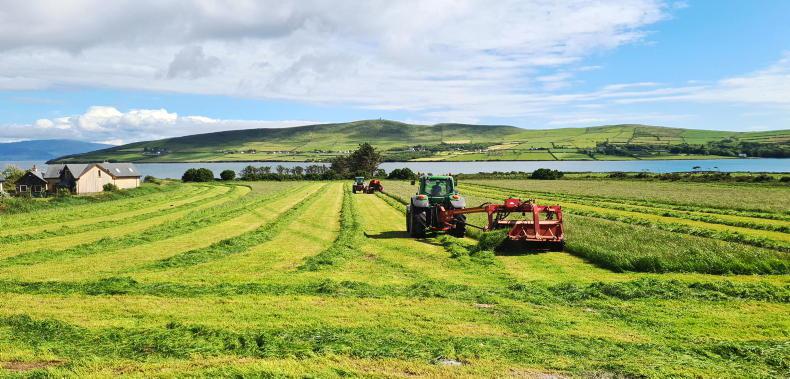
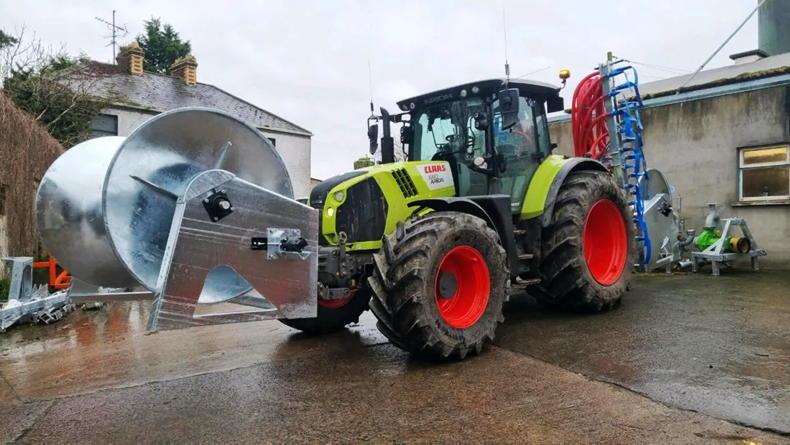
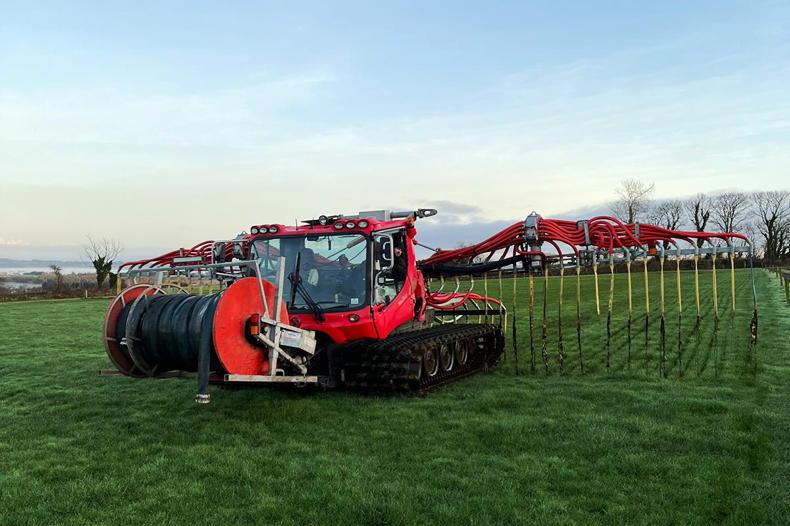
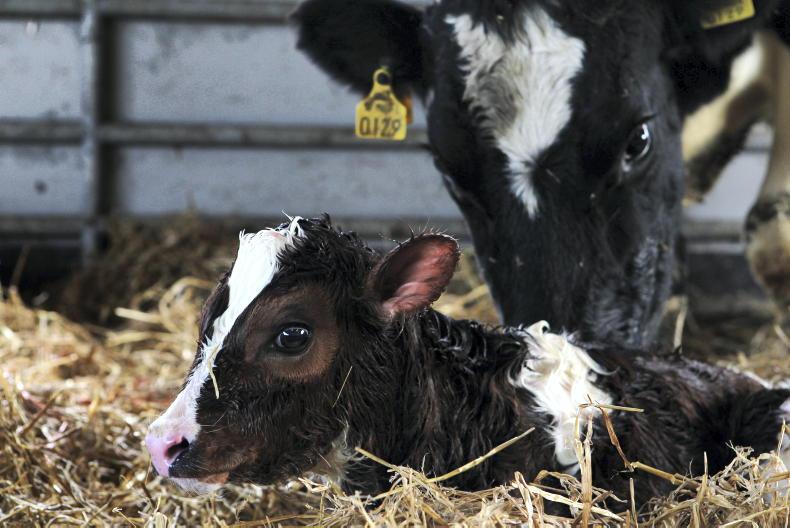
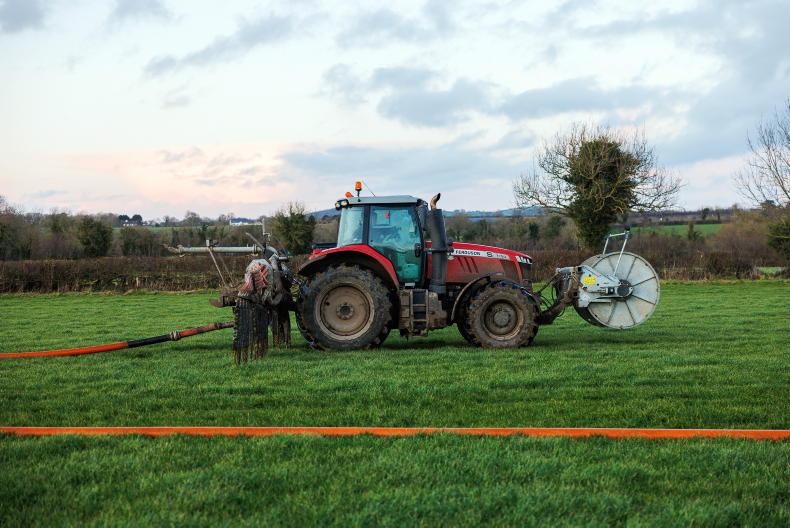
SHARING OPTIONS